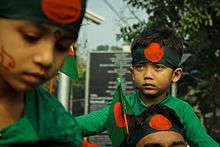Independence Day (Bangladesh)
| Independence Day | |
|---|---|
.svg.png) The first flag of the independent Bangladesh, which was subsequently replaced by the current version. | |
| Official name | Independence Day of Bangladesh |
| Observed by |
|
| Type | National holiday |
| Celebrations | Flag hoisting, parades, award ceremonies, singing patriotic songs and the national anthem, speeches by the President and Prime Minister, entertainment and cultural programs. |
| Date | March 26 |
| Next time | 26 March 2016 |
| Frequency | Annual |

The Independence Day of Bangladesh (Bengali: স্বাধীনতা দিবস Shadhinôta Dibôs), also referred to as 26 March, is a national holiday. It commemorates the country's declaration of independence from Pakistan in the late hours of 25 March 1971 by the "Father of the Nation" Bongobondhu Sheikh Mujibur Rahman before he was arrested by Pakistani forces.[1]
History
Once after the 1970 Pakistan Elections, Sheikh Mujibur Rahman linguistically and culturally of Bangla background, then head of the largest political party of Pakistan, the Awami League, had won with a clear majority, the Pakistan establishment was not willing to hand over power or be led by Mujib. Negotiations began, but Sheikh Mujib's reputation was such that the ruling Punjabi leadership never trusted him, let alone by the Pakistan established, no matter Mujib's efforts. When all indications gradually surfaced crystal clear, promises given were not followed through, the whole nation of Bangla speaking Muslims and Hindus of East Pakistan dived into the spirit and vibe of a real struggle. Mujib was still determined to keep Pakistan united under his legitimate and legal claim and did not commit the nation politically for independence neither called upon the masses with such an endeavor. He, however delivered an emotion loaded angry speech as response filled with warnings of a struggle for independence, displaying his strength of political control over society. Out in the streets the reaction was boiling as another fighting spirit with independence aspirations was inciting outright struggle with his fiery speeches to huge crowds around the nation, Maulana Bhasani. Initially the Pakistan authorities called curfews, paved way for huge influx of military hardware and personnel from western Pakistan by sea and air. Pakistan authorities also blocked supplies going to the general population. Killings and destruction of property was on a climatic rise around the main port cities of Khulna and Chittagong and other important economic points of trade and education. Police and the military units were deployed in numerous areas of the country. Pakistan Urdu and Punjabi speaking personnel rounded up Bangla speaking armed forces officers, nco's and enlisted personnel. Forced disappearances went rampant. On the 25th of March evening in an interview with David Frost, Sheikh Mujib still called out openly for negotiation and a united Pakistan. That night the Pakistan army spilled out to the streets killing and destroying everything on sight. It was official, they were not ready for a peaceful transfer of political power to the Awami League led by Sheikh Mujibur Rahman. During the early hours of 26th March1971 the independence of Bangladesh was declared from an unexpected and unknown patriot, and the guerilla struggle officially began. The people of then independence declared Bangladesh took part in this war to be a separate nation independent from Pakistan. Independence for Bangladesh was gained through a nine-month guerilla war against the Pakistan Army, and their collaborators (commonly known as Razakars in Bangla রাজাকার) which resulted in the loss of about 100 thousand lives. The Bangladesh Forces, later with military support from India, defeated the Pakistan Army ending the war on 16 December in the same year.
Celebrations

Independence Day is commonly associated with parades, political speeches, fairs, concerts, and ceremonies, and various other public and private events celebrating the history, and traditions of Bangladesh. TV and radio stations broadcast special programs and patriotic songs in honor of Independence Day. Generally, a thirty-one gun salute is conducted in the morning. The main streets are decorated with national flags. Different political parties and socioeconomic organizations undertake programs to mark the day in a befitting manner, including paying respects at Jatiyo Sriti Soudho, the national memorial at Savar near Dhaka.
Independence Award
The Independence Award, which is bestowed upon Bangladesh citizens or organizations on the eve of the Independence Day, is the highest state award given by the government of Bangladesh. This annual award, instituted in 1977, is given for substantial contribution in Independence War, the language movement, education, literature, journalism, public service, science-technology, medical science, social science, music, games and sports, fine arts, rural development, and other fields.
Google displayed a doodle commemorating the Independence Day of Bangladesh on 26 March 2013 on their bd domain.
See also
References
- ↑ "Bangladesh profile - Timeline". BBC News. Retrieved 27 March 2015.
| Wikimedia Commons has media related to Independence Day (Bangladesh). |
| ||||||||||||||||||